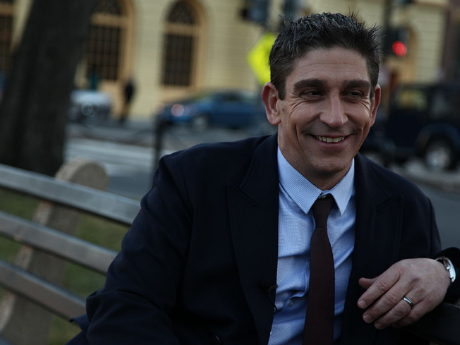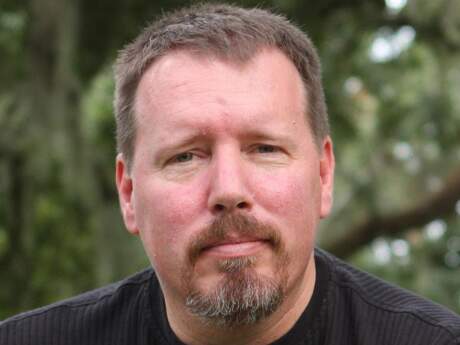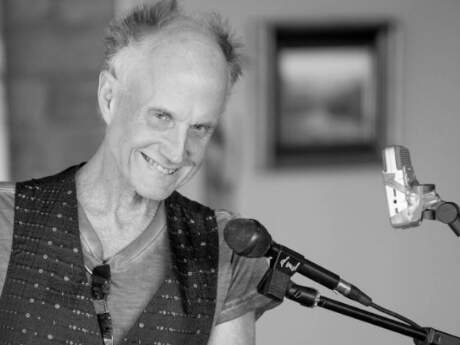Red, White, & Blue
Richard Blanco

Do you value the examination of the political in poetry? If so, what experience(s) taught you its importance?
Honestly, I think I've shied away the political in poetry, both in my own work and others. Ironically, this stems from having been raised in a such a politically charged community, namely, the Cuban exile community in Miami since the early 1970s. Politics permeated the city; it was virtually on every person's mind and tongue: the men at every corner cafetería drinking cafecistos and smoking their long tabacos as they debated the fate of Cuba; the ladies at my grandmother's beauty salon gossiping over who had been a Castro sympathizer and who squealed on whom; and at my own family gatherings which always disintegrated into shouting matches over who and/or what was to blame for the Cuban Revolution. Some blamed Batista, others hailed him; some bad-mouthed Prío, others defended him; and everyone blamed Kennedy for the Bay of Pigs "fiasco," calling him a coward and a son of a bitch. They seemed to detest him as much as they detested the other son of a bitch—Castro—who robbed "us" of everything and destroyed the paradise that was Cuba. Yet my grade school social studies books glorified Kennedy as one of America's greatest presidents; my high school history teacher portrayed pre-revolutionary Cuba as a destitute country full of corruption, and praised Castro for his social reforms, quoting statistic in support of dramatic improvements in health care, literary, and education; and many intellectuals I met in college glorified post-revolutionary Cuba as a model society. Who was telling the truth? Which was the "real" Cuba? Who got the story "right?" Since a very young age, such first-hand experience with political rhetoric and contradictions like these confused me, but eventually made it clear to me that truth often lies in the gray area between the two sides of every "story." I was left with a very bad taste in my mouth for politics and a disdain for anything that "smelled" of bias. Jaded, I suppose, I still tend to tune-out any stance that I perceived as politically extreme, even those I come across in poetry. And definitely avoid being overtly political in my work. Though as I respond to this question, I am thinking that perhaps I may have thrown the baby out with the bathwater, so to speak. Perhaps it is time for me to examine my bias against my perceptions of bias and explore what truths lie in poetry I may have passed over.
If you write about politics frequently, what issues, difficulties, advantages and disadvantages do you negotiate? Which poets do you draw on when conducting such negotiations?
Being a Cuban-American from Miami many people presume that I am a hard-core right-wing conservative; on the other hand, as a queer poet, many immediately think I am a total left-wing liberal. I resent these assumptions; and—like most artists, I suppose—I rebel against expectations and stereotypes. Given this, and the circumstances of my up-brining as I've just explained above, I stand right in the middle of these extremes—and so does my poetry I believe. I do not vilify nor glorify Castro; I don't believe Cuba was a "paradise" before or after the revolution; I don't defend my conservative elders nor do I dismiss their views as preposterous. My poetry and I are not exclusively aligned with any one particular group—Latino, Cuban, queer, or "white." Though I embrace and respect each one, I prefer wading in the middle where I can examine and question all sides of all "stories." I was inclined to say that my poetry is apolitical, but thinking about it more carefully here, instead I would say my work may be pan-political. By this I mean that I am interested in many political angles, often contradictory ones, whether describing my destitute Tía Ida living in a Cuba crippled by Socialism, or the broken spirit of a small town in Italy erased by run-a-muck Capitalism. Regardless, one thing is clear to me: rather than "talk" politics in my work, I prefer to "show" the consequences of politics through portraits of people and places. I am more interested in the effects than the causes, in discovering how we survive and make sense of all the suffering the world throws in our faces over and over again, rather than finding a politicized reason for the chaos or pointing a finger at someone or something. For me, it's not about finding blame or solutions; it's narrating the stories of survival and, hopefully, triumph of the human spirit. This is the kind of quality I admire in the "political" work of such poets as Caroline Forché and Martín Espada.
What 'responsibility' does an artist have to artistically engage his or her own politic?
None I would say. Once the shadow of responsibility (or any other shadow) is cast over an artist, s/he is longer free to create. It would similar to artists in totalitarian regimes whose works are admired only if they are aligned with the ideals of the state. I don't want to live in any society or country that thinks I "should" produce any particular kind of work about any particular subject. Art by definition is free from responsibilities. However, it would be entirely different if an artist freely took on such a responsibility out of a soulful necessity, as many poets do in America. It is interesting that the word "artist" is used in this question instead of "poet." I wonder if dancers, actors, painters, sculptors, musicians are ever asked about the responsibility of their "politic" in their work? It seems to me that poets/writers are often unduly held "responsible" on this matter and questioned more frequently and unfairly than other artists.
In 2008, Horace Engdahl, the secretary of the Nobel prize jury, wagged his finger at American writing saying that "[American writers] don't really participate in the big dialogue of literature. […] That ignorance is restraining." What do you think? How have recent American poets engaged with or neglected the so-called 'big dialogue' of literature? Is this 'big dialogue' a political one?
I would say that the bigger question here is who determines or defines what the "big dialogue" is? It seems to me that the "big dialogue" is completely subjective, determined by the unique social, political historical, cultural, and economic contexts that make up each country, nay each region, each city and town—indeed, every individual in the unique place and time the s/he is writing. I suspect that for Engdahl the "big dialogue" is defined though a Eurocentric lens, based on another statement he made to the Associated Press: "…you can't get away from the fact that Europe still is the centre of the literary world...not the United States." It is clear to me that his "big dialogue" is certainly not America's "big dialogue" and therefore he dismisses American literature. America has many "big dialogues," including that of cultural negotiation and cultural equality in the works of Latino/a authors such as Martín Espada, Jimmy Santiago Baca, Sandra Cisneros, Alberto Rios, Lorna Dee Cervantes, Gloria Anzaldúa—just to name a few—spanning over three decades. Did Engdahl not get the memo on that one? His judgments are almost laughable and don't deserve much attention. I think it's a preposterous generalization to dismiss a whole country of writers (has he read every single American author?). And equally preposterous is the suggestion that American writers should engage the world in a different way—as if we could; as if it were possible to abandon the unique contexts from which our work is born and write how we "should" be writing.
Is there room for romantic or rugged individualism in political poetry (as opposed to a capacious perspective of Whitman or other past poets)? If so, where is its place?
Perhaps I am misreading this question, but wasn't Whitman romantic and individualistic while still being capacious? I'm not sure these are mutually exclusive qualities. In fact, I would say it is exactly this kind of dynamic combination of qualities that makes for powerful political work and great political poets. Namely, the ability to remain an individual voice even within a politicized group, and yet to think capaciously in broad strokes, be inclusive, reach broader audiences. One aspect of political writing that often frustrates me is when it preaches to the choir; when it fails to step outside its self-set boundaries and doesn't approach the political in creative ways; when it is feels exclusive, rather than inclusive, and holds no larger vision outside the agenda of its own cause.
Where do you draw the line between poetry and propaganda? What is the purpose of such a line? Should today's poet be concerned with editorial censorship?
For me it comes down to the quality of the work. In some circles of authors that I've been involved with, poor craft is sometimes overlooked for the sake of the "message." That is, the work is applauded for its content, while it's aesthetics—or lack thereof—are overlooked. At that point I begin to question if such a work is valuable solely because of its political message. If the answer is "yes," then I tend to be more suspect and dismissive. For me, the first priority is to write a damn good poem. The "message"—political or otherwise—should be integral to the poem and serve the it; the poem should not serve the message. That's putting the cart before the ox; beginning a poem with an idea, an agenda, rather than with an emotional center, a mystery, which is where I feel good, honest poetry begins. To this end, I believe that if a poet's sole purpose is to express or expound some political viewpoint with little or no regard for the craft and aesthetics of the art, then it drifts into propaganda. In these instances, I often ask myself, "Why doesn't such a poet just write an essay or run for office, or volunteer for his/her cause?" Using poetry as a vehicle for a message with little or no regard for craft is just a means to an end, not art, not good poetry.
What are your thoughts on shifts in the state of the political voice in contemporary poetry, from the early modernist to the beat poets and black arts movement, to today? Where are we now? Where are we going?
I'm not a scholar of these movements and so I feel I cannot comment on them at will. However, as for the latter part of the question, I think contemporary poetry today is sorely lacking any unified poetic-political "movement." Here, I'm tempted to blame and demonize MFA programs and the birth of the career-poet. After all, competing for so many awards, prizes, publishers, tenure-track jobs, study abroad programs, and prestigious conferences, leaves little time or energy for larger concerns. But I know it's not that simple, and MFA's have done a great deal to expand poetry and usher in ethno-political voices that would have otherwise never been heard. Here I include myself; if it wasn't for my MFA program I doubt I would have ever been able to take my place at the table as a Latino writer. The last two decades have seen a tremendous rise in ethno-political voices/groups: Latinos, Africa-Americans, Asian-Americans, Native-Americans, Middle-Eastern Poets, and GLBT Poets—just to name a few. American poetry has been in expansion mode, which is counter to the idea of a unifying movement. It feels like each of these "camps" is still writing in their own corner, fragmented, as they must be for the time being. But at some point, as the expansion nears it natural end, I think we will begin talking to each other more, listening more to each other, and begin to discuss how each one of our "stories" is part of a larger "story." In my view, that's the next "big dialogue" that America will have with itself.
* * *
Richard Blanco's first book, City of a Hundred Fires, explores the yearnings and negotiation of cultural identity as a Cuban-American, and received the prestigious Agnes Starrett Poetry Prize from the University of Pittsburgh Press. His second book, Directions to The Beach of the Dead won the 2006 PEN / American Beyond Margins Award for its continued exploration of the universal themes of place and homecoming. His third collection, Looking for The Gulf Motel, was published by the University of Pittsburgh Press in 2012. A builder of cities and poems, Blanco is also a professional Civil Engineer.
Published September 2012.


